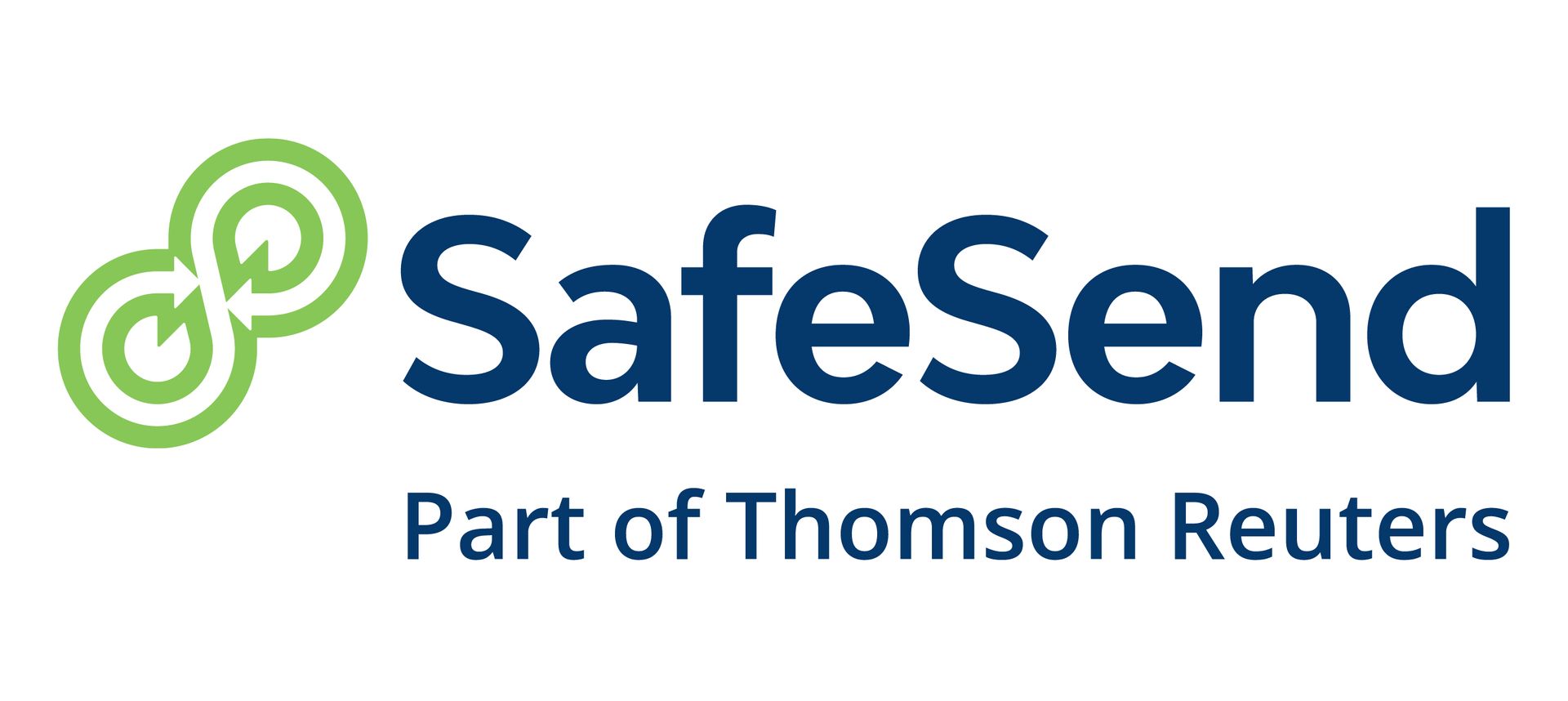Important Updates & News

SafeSend Gather and SafeSend Client Portal are components within the SafeSend One™ platform, each designed to streamline different aspects of the tax preparation and client interaction process. SafeSend Gather focuses on automating the initial phase of tax preparation by simplifying the collection of necessary documents and information from clients. Leveraging advanced artificial intelligence, it automatically generates document request lists, identifies and categorizes uploaded documents, and provides real-time visibility into document completion status. This ensures a frictionless document gathering process for both firms and clients. SafeSend Client Portal , on the other hand, is designed to enhance the overall client experience by providing a centralized dashboard for managing all tasks and documents throughout the tax lifecycle. It offers features such as a downloadable, sortable, and searchable repository of all documents exchanged between client and firm, a simple actionable to-do list, comprehensive notifications for important deadlines, a unified K-1 distribution page, and a centralized location to view and pay estimated or actual tax payment vouchers. This portal empowers clients to have greater independence and control over their tax journey. In summary, while SafeSend Gather streamlines the document collection process at the beginning of the tax preparation, SafeSend Client Portal provides an ongoing, centralized platform for clients to manage their tax-related tasks and documents throughout the entire tax lifecycle. Please reach out to our office if you have any questions about the SafeSend platform and it's features. CLICK or CALL . Source: SafeSend Learn

Managing tax documents doesn’t have to be overwhelming. With the SafeSend Client Portal , you gain a secure, convenient, and efficient way to store, access, and share your tax documents anytime, anywhere. This cutting-edge platform is designed with your ease and security in mind, ensuring that your tax preparation process is smooth and stress-free. Benefits of the SafeSend Client Portal Secure Access to Your Documents The SafeSend Client Portal employs advanced encryption and security protocols to protect your sensitive financial information. You can confidently upload, store, and retrieve your tax documents without worrying about data breaches. 24/7 Availability With the portal, your documents are available at your fingertips, whether you’re at home, at work, or on the go. No need to hunt through paperwork—everything is digitally organized in one place. Streamlined Communication The portal allows you to securely share documents with our office and receive important updates or requests. This eliminates the need for back-and-forth emails or physical mail, saving you time and hassle. Environmentally Friendly By using a digital portal, you’re reducing paper waste and contributing to a more sustainable future. User-Friendly Design SafeSend’s intuitive interface makes it easy to navigate, even if you’re not tech-savvy. Step-by-Step Guide to Setting Up Your SafeSend Client Portal Receive the Invitation You’ll receive an email with a link to set up your SafeSend Client Portal. The email will include a secure invitation link that is unique to you. Create Your Account Click the invitation link and follow the prompts to create your account. You’ll need to set up a username and password and provide some basic information to verify your identity. Be sure to hit 'Sign Up' under the login screen before trying to log into an account. Verify Your Identity For added security, the portal may send a verification code to your email or phone. Enter this code to complete the setup process. Log In Once your account is set up, log in using your new credentials. Bookmark the login page for easy access in the future. Explore the Portal Take a moment to familiarize yourself with the portal. You’ll find sections for uploading documents, viewing files, and communicating with our team. Upload Your Documents Use the upload feature to submit your tax documents. You can drag and drop files or select them manually from your device. Accepted file types include PDFs, images, and spreadsheets. Monitor Progress The portal allows you to track the status of your submissions and see any additional requests from our team. You’ll receive notifications when updates are made. Access Your Completed Tax Return Once your return is complete, you can securely download a copy directly from the portal. All files are stored for your convenience and future reference. Still struggling to set up a client portal? Here is, a direct from SafeSend, step by step guide for 1st time portal setup/access: Client Portal Experience – SafeSend Returns Start Using SafeSend Client Portal Today The SafeSend Client Portal is a powerful tool designed to make your tax preparation experience smoother and more efficient. If you have questions about setting up or using the portal, our team is here to assist you every step of the way. Contact us today to get started and take the first step toward a more organized and stress-free tax season!

Collecting and organizing tax documents can be a time-consuming and stressful part of the tax preparation process. That’s why we’re excited to offer SafeSend Gather , a secure and user-friendly tool designed to simplify how you share your tax documents with us. Here’s an overview of the benefits of SafeSend Gather and how to get started. Benefits of SafeSend Gather Secure Document Sharing SafeSend Gather ensures your sensitive tax information is protected with top-tier encryption, safeguarding your personal and financial details during the document submission process. Convenient and User-Friendly Whether you’re at home or on the go, SafeSend Gather’s intuitive interface makes it easy to upload and share documents directly from your computer, tablet, or smartphone. Save Time and Stay Organized The platform’s streamlined approach eliminates the need for printing, scanning, or mailing documents. All your tax files stay neatly organized in one place, ready for review. Track Your Progress SafeSend Gather allows you to see which documents have been submitted and which are still needed, ensuring nothing gets overlooked. Step-by-Step Guide to Using SafeSend Gather Receive the Invitation You’ll receive an email from our office with a personalized link to access SafeSend Gather. This link is unique to you and will guide you to your secure document portal. Log In Click the link in the email and follow the instructions to verify your identity. You may need to input a secure access code sent to your email or phone for additional security. Review Document Requests Once logged in, you’ll see a checklist of the documents we need for your tax preparation. This checklist is customized to your tax situation to ensure we receive all the necessary information. Please be sure to sign your Engagement Letter and fill out your organizer before uploading your tax documents. Keep in mind, you may have additional tax documents to the ones listed in your checklist Gather bases the checklist on the previous tax year, so if there have been any changes to employment, investments(ex: sale of stocks), or assets(ex: purchase of a home) the checklist may not reflect these. Upload Documents Use the upload feature to submit your documents. You can drag and drop files from your device or select them manually. SafeSend Gather accepts a variety of file types, including PDFs, images, and spreadsheets. Confirm Submission After uploading your documents, review the list to ensure everything has been submitted. Once complete, click “Submit” to notify us that your documents are ready for review. Follow Up if Needed If we require additional documents or clarification, you’ll receive an email notification prompting you to log back into SafeSend Gather to provide the requested information. Start Using SafeSend Gather Today SafeSend Gather is just one of the ways we’re making the tax preparation process easier and more efficient for you. If you have questions or need assistance with setting up or using the platform, don’t hesitate to contact our office. Let’s work together to make this tax season seamless and stress-free!

As the new year begins, it’s natural to be focused on what you might owe or receive as a refund for your 2024 tax return. However, while working through your annual tax filing, it’s a great time to familiarize yourself with adjustments that may impact your tax planning for 2025. Inflation has caused changes to certain thresholds and limits, and understanding these now can help you plan ahead. Here are answers to five commonly asked questions about 2025 tax figures: 1. How much money can I contribute to an IRA? If eligible, you can contribute up to $7,000 to a traditional or Roth IRA in 2025. If you’re age 50 or older, you can make an additional $1,000 “catch-up” contribution . Note that these amounts remain the same as in 2024. Keep in mind that your contributions cannot exceed 100% of your earned income if it’s less than the contribution limit. 2. What’s the maximum I can contribute to a 401(k) plan through my job? The maximum you can contribute to a 401(k) or 403(b) plan rises to $23,500 in 2025 (up from $23,000 in 2024). If you’re 50 or older, you can also make a $7,500 catch-up contribution , which remains unchanged. Exciting news for 2025: Employees aged 60 through 63 can make enhanced catch-up contributions of up to $11,250 , including the $7,500 standard catch-up contribution. This new provision offers more opportunities to save for retirement during your peak earning years. 3. How much must I earn not to pay Social Security tax on my entire salary? The Social Security tax wage base increases to $176,100 for 2025, up from $168,600 in 2024. This means that you don’t owe Social Security tax on amounts earned above this threshold. However, remember that Medicare tax must still be paid on all earned income regardless of the amount. 4. How much can I give one person without requiring a gift tax return? The annual gift tax exclusion rises to $19,000 in 2025, up from $18,000 in 2024. This means you can give any individual up to this amount without needing to file a gift tax return. This increase provides more flexibility for tax-efficient giving. 5. How much is the Business Mileage Rate for 2025? Effective Jan. 1, 2025, the standard mileage rate for the business use of a car, van, pickup truck or panel truck is 70 cents per mile . This is up from 67 cents per mile for 2024. (For medical or eligible moving purposes, the 2025 rate is 21 cents per mile , and for charitable driving, it’s 14 cents per mile , both unchanged from 2024.) These rates apply to gasoline and diesel-powered vehicles and to electric and hybrid-electric automobiles. To protect your deduction, don’t forget to keep detailed mileage records. Plan Ahead These are just a few of the tax figures that could impact your financial strategy. Understanding them early can help you make the most of your contributions, deductions, and other planning opportunities. For personalized guidance or more information about 2025 tax changes, reach out to our office HERE or CALL . You can also reach out directly to your preparer. We’re here to help you make informed decisions and optimize your tax position for the year ahead.

UPCOMING TAX DEADLINES January 15 Employers : Deposit nonpayroll withheld income tax for December 2024 if the monthly deposit rule applies. Individuals : Pay the fourth installment of 2024 estimated taxes (Form 1040-ES) if not paying income tax through withholding or not paying sufficient income tax through withholding. Entities : 2025 E-Filing opens for all entity returns. January 27 Individuals : 2025 E-Filing opens for 1040(individual) returns. January 31 Employers : File 2024 Form W-2 (Copy A) and transmittal Form W-3 with the Social Security Administration. Employers : File a 2024 return for federal unemployment taxes (Form 940) and pay any tax due if all the associated taxes weren’t deposited on time and in full. Employers : Report Social Security and Medicare taxes and income tax withholding for the fourth quarter of 2024 (Form 941) if all of the associated taxes due weren’t deposited on time and in full. Employers : Provide 2024 Form W-2 to employees. Businesses : Provide Form 1098, Form 1099-MISC (except for those with a February 18 deadline), Form 1099-NEC and Form W-2G to recipients. Individuals : File a 2024 income tax return (Form 1040 or Form 1040-SR) and pay the tax to avoid penalties for underpaying the January 15 installment of estimated taxes. February 10 Employers : File a 2024 return for federal unemployment taxes (Form 940) if all associated taxes due were deposited on time and in full. Employers : Report Social Security and Medicare taxes and income tax withholding for the fourth quarter of 2024 (Form 941) if all associated taxes due were deposited on time and in full. Individuals : Report January tip income of $20 or more to employers (Form 4070).

As the year winds down, charitable giving often takes center stage. While supporting your favorite causes is rewarding, it’s equally important to ensure your generosity qualifies for valuable tax deductions. Proper documentation is key, and the requirements depend on the type and size of your donation. Here’s a guide to substantiating your gifts: Cash Gifts Under $250: A canceled check, bank statement, credit card statement, or a receipt from the charity with its name, date, and gift amount suffices. $250 or More: Obtain a contemporaneous written acknowledgment from the charity stating the amount of the gift. Multiple smaller gifts to the same charity that total $250 or more still follow the rules for gifts under $250. Noncash Gifts Under $250: Keep a receipt with the charity’s name, date, location, and a description of the donation. $250 or More: The charity must provide a written acknowledgment with all the details required for cash gifts, plus a property description. Over $500: Retain additional records detailing how and when you acquired the property, your adjusted basis, and file Form 8283. Over $5,000 ($10,000 for closely held stock): Include a qualified appraisal and an appraisal summary signed by both the appraiser and the charity with your return. Publicly traded securities don’t require an appraisal. Over $500,000 ($20,000 for art): Submit the full signed appraisal with your return. Goods or Services Received in Exchange If the charity provides anything in return for your donation (e.g., a book, meal, or event ticket), request the fair market value of the item and subtract it from your deduction. While tax benefits may not drive your charitable giving, they can influence how much you can afford to donate. Document your gifts thoroughly to ensure you receive the deductions you deserve while supporting the causes you care about. Tax Planning Considerations of Gifting Most clients do not qualify to itemize their deductions due to the high standard deduction. Therefore, many clients cannot take advantage of the the charitable contribution deduction. However, if a client chooses to skip one year of charitable contributions and bundle two years together, their overall itemized deductions may be larger than the standard deduction. By implementing this strategy every other year, a client may maximize the benefit of charitable gifting. A second strategy for clients subject to RMD rules would be to utilize a Qualified Charitable Distribution (QCD) from their IRA, SIMPLE or SEP. This allows the Taxpayer to make their RMD directly to a charity without recognizing taxable income. This satisfies the RMD requirements and helps keep the Taxayer's AGI lower that may affect other phaseouts. Need assistance or have any questions on these tax implications? Contact our office for guidance: CLICK HERE or CALL (412)875-5719

The post-COVID-19 era has prompted many to reconsider where they call home. With remote work and early retirement becoming more common, some are exploring the possibility of converting a rental or vacation property into their primary residence. While this shift offers potential benefits, it also introduces complex tax implications. The Home Sale Exclusion Under Sec. 121 Taxpayers selling a primary residence may qualify for the Sec. 121 home sale exclusion, allowing them to exclude up to $250,000 ($500,000 for married couples filing jointly) of capital gains from taxable income. To qualify, they must have owned and used the property as their primary residence for at least two of the five years preceding the sale. However, this exclusion is limited when the property has periods of “nonqualified use,” such as when it served as a vacation home or rental property. Gains attributable to these periods are taxable. Example: A couple who converts their vacation home into a primary residence and later sells it will need to allocate gains between qualified use (as a primary residence) and nonqualified use (as a vacation home). This calculation ensures the exclusion applies only to the qualified portion. Rental Property Considerations When a rental property becomes a primary residence, tax complexities arise from prior use as an income-generating asset. Key factors include: Depreciation Recapture: Taxpayers must pay taxes on depreciation claimed during the rental period, taxed as ordinary income up to 25%. Passive Loss Carryforwards: Unused passive losses incurred during the rental period may remain suspended if the property’s sale qualifies partially under Sec. 121. Example: If a rental property with $50,000 in depreciation and $30,000 in passive loss carryforwards is converted and sold, the depreciation recapture and suspended losses may significantly impact the taxable gain. Transitioning Expenses and Deductions Converting a property to a primary residence changes deductible expenses. Expenses like repairs and insurance, previously deductible against rental income, become non-deductible. However, real estate taxes and mortgage interest may still be itemized deductions. Navigating the Web of Tax Implications Relocating to a former vacation or rental property involves meticulous tax planning. Taxpayers must understand the nuances of Sec. 121, maintain detailed records of property improvements, and consult professionals to mitigate tax liabilities. This transition, though complex, offers opportunities for tax savings with proper planning and professional guidance. Need assistance or have any questions on these tax implications? Contact our office for guidance: CLICK HERE or CALL (412)875-5719 Step-By-Step Guide to Rental/Vacation Home to Primary Residence Conversion Converting a rental or vacation home into your primary residence involves a mix of practical, legal, and financial considerations. Here’s a step-by-step guide to navigate the process: 1. Legal and Zoning Compliance Zoning Regulations: Check local zoning laws to ensure the property can be used as a primary residence. Some vacation properties may have restrictions. Homeowners Association (HOA) Rules: If the home is part of an HOA, confirm that living there full-time is permitted. 2. Financial Adjustments Mortgage Implications: Inform your lender if your mortgage was originally for an investment or secondary home. A primary residence typically qualifies for lower interest rates. Refinancing might be an option to take advantage of better rates. Tax Considerations: The property tax rate may change if it transitions to a primary residence. Rental income and deductions will no longer apply once it's your primary residence. Capital Gains Exemption: If you later sell the home, you may qualify for exclusions on capital gains (up to $250,000 for individuals, $500,000 for couples) if you’ve lived there for two out of the last five years. 3. Utilities and Infrastructure Ensure the property has year-round utilities and services such as heating, water, and reliable internet. Update your mailing address with the post office and all relevant entities. 4. Notify Authorities Update your driver's license and vehicle registration to reflect your new address. Change your voter registration. 5. Insurance Transition from rental or vacation property insurance to a primary homeowner’s insurance policy, which may have different coverage requirements. 6. Lifestyle Adjustments Consider proximity to work, schools, healthcare, and other amenities you rely on. Adjust any vacation-focused amenities to better suit everyday living. 7. Inform Tenants (if applicable) If the property is rented out, provide notice as required by your lease agreement and local laws.

Natural disasters have affected many Americans in 2024, causing widespread damage to homes and personal property. These losses, known as “personal casualty losses,” result from sudden, unexpected, or unusual events such as hurricanes, tornadoes, floods, earthquakes, fires, acts of vandalism, or terrorist attacks. However, not all personal casualty losses are eligible for a tax deduction. Eligibility for Deduction To deduct a casualty loss, you must meet two primary criteria: Itemized Deductions: You must itemize deductions on your tax return. Federally Declared Disaster: Through 2025, only losses resulting from federally declared disasters qualify for a deduction. Exception for Personal Casualty Gains There is an important exception to the federally declared disaster requirement. If you receive insurance proceeds that exceed the tax basis of your damaged or destroyed property, creating a personal casualty gain , you can deduct personal casualty losses unrelated to a federally declared disaster—but only up to the amount of your personal casualty gains. Filing for a Previous Year In some cases, taxpayers can deduct a casualty loss on the tax return for the year preceding the disaster. This allows you to claim a refund by filing an amended return if you’ve already submitted the relevant year’s tax return. Navigating Complex Rules Claiming a casualty loss deduction involves understanding nuanced tax rules and filing requirements. If you’re unsure about your eligibility or need assistance with amended returns, consult a tax professional to maximize your potential deductions. While natural disasters bring significant challenges, careful tax planning can help ease the financial burden and ensure you take advantage of available relief options. Casualty losses for business related assets are different. Please contact your accountant to discuss the specifics of your situation. Need assistance? Contact our office for guidance: CLICK HERE or CALL (412)875-5719

UPCOMING TAX DEADLINES December 16 Calendar-year corporations : Pay the fourth installment of 2024 estimated income taxes, completing Form 1120-W for the corporation’s records. Employers : Deposit Social Security, Medicare and withheld income taxes for November if the monthly deposit rule applies. Employers : Deposit nonpayroll withheld income tax for November if the monthly deposit rule applies. December 31 Don't Miss This Important Deadline If you’re subject to required minimum distributions (RMDs), you must take your 2024 RMD by Dec. 31 to avoid penalties. RMDs are mandatory withdrawals from retirement plans such as 401(k)s, IRAs, SIMPLE IRAs and SEPs. Roth accounts aren’t subject to RMDs during the owners’ lifetimes. RMDs are taxable income subject to ordinary-income tax (not long-term capital gains) rates. Previous tax law required RMDs to begin at age 72 and imposed a penalty of 50% on missed withdrawals. The SECURE 2.0 Act raised the age to 73 and lowered the penalty to 25% (or 10% if corrected within two years). Younger taxpayers can be subject to RMDs if they inherited a retirement account. Contact our office as soon as possible for help calculating the correct amount for your RMDs. Here’s more from the IRS: IRS reminds those aged 73 and older to make required withdrawals from IRAs and retirement plans by Dec. 31; notes changes in the law for 2023 Internal Revenue Service January 10 Individuals : Report December 2024 tip income of $20 or more to employers (Form 4070). January 15 BOI (update) : Year-end tax planning reminder: Q4 estimates due.


